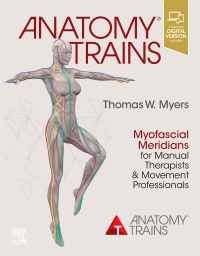
Anatomy Trains, 4th Edition
Paperback

Give your students a multi-dimensional understanding of musculoskeletal anatomy with Anatomy Trains: Myofascial Meridians for Manual Therapists & Movement Professionals, 4th Edition. This hugely successful, one-of-a-kind title continues to center on the application of anatomy trains across a variety of clinical assessment and treatment approaches — demonstrating how painful problems in one area of the body can be linked to a "silent area" away from the problem, and ultimately giving rise to new treatment strategies. Fully updated with the latest evidence-based research and now including an enhanced eBook version with every print purchase, this new edition is an essential component of any professional program involving human movement, including physical therapy, massage therapy, structural integration, craniosacral therapy, yoga instruction, osteopathology, manual therapy, athletic training, personal training, dance and movement, chiropractology, and acupuncture.
-
- New photos and images of fascial tissues, adhesions, and layers provide a better understanding of text content
- Revised and expanded content reflects the most up-to-date research and latest evidence for the scientific basis of common clinical findings
- New, larger library of videos includes animations and webinars with the author
- New Anatomy Trains in Motion section by guest author Karin Gurtner uses Pilates-evolved movement to explore strength and plasticity along myofascial meridians
- New addition: Anatomy Trains in Quadrupeds (horses and dogs) is mapped for equine and pet therapies by Rikke Schultz, DVM, Tove Due, DVM, and Vibeke Elbrønd, DVM, PhD
- New appendix: Updated fascial compendium on elements, properties, neurology, and origins of the fascial system
- NEW! enhanced eBook version is included with print purchase, which allows students to access all of the text, figures, and references from the book on a variety of devices
- Revolutionary approach to the study of human anatomy provides a holistic map of myoanatomy to help improve the outcomes of physical therapies that are traditionally used to manage pain and other musculoskeletal disorders
- Relevant theory descriptions are applied to all common types of movement, posture analysis, and physical treatment modalities
- Intuitive content organization allows students to reference the concept quickly or gain a more detailed understanding of any given area according to need
- Section on myofascial force transmission in gait dynamics is written by guest author James Earls
- Robust appendices discuss the relevance of the Anatomy Trains concept to the work of Dr Louis Schultz (Meridians of Latitude), Ida Rolf (Structural Integration), and correspondences with acupuncture meridians
-
- New photos and images of fascial tissues, adhesions, and layers provide a better understanding of text content
- Revised and expanded content reflects the most up-to-date research and latest evidence for the scientific basis of common clinical findings
- New, larger library of videos includes animations and webinars with the author
- New Anatomy Trains in Motion section by guest author Karin Gurtner uses Pilates-evolved movement to explore strength and plasticity along myofascial meridians
- New addition: Anatomy Trains in Quadrupeds (horses and dogs) is mapped for equine and pet therapies by Rikke Schultz, DVM, Tove Due, DVM, and Vibeke Elbrønd, DVM, PhD
- New appendix: Updated fascial compendium on elements, properties, neurology, and origins of the fascial system
- NEW! enhanced eBook version is included with print purchase, which allows students to access all of the text, figures, and references from the book on a variety of devices
-
Video list
1. Laying the Railbed
2. The Rules of the Road
3. The Superficial Back Line
4. The Superficial Front Line
5. The Lateral Line
6. The Spiral Line
7. The Arm Lines
8. The Functional Lines
9. The Deep Front Line
10. Anatomy Trains in Training
With contributions by James Earls and Karin Gurtner
11. BodyReading® – Structural Analysis
Appendix 1: Fascia and Biomechanical Regulation
Appendix 2: A Note on the Meridians of Latitude
Appendix 3: Structural Integration
Appendix 4: Myofascial Meridians and Asian Medicine
Appendix 5: Anatomy Trains in Quadrupeds - Initial investigations
By Rikke Schultz, Tove Due, and Vibeke Elbrønd
Anatomy Trains Terms
Bibliography



 as described in our
as described in our 